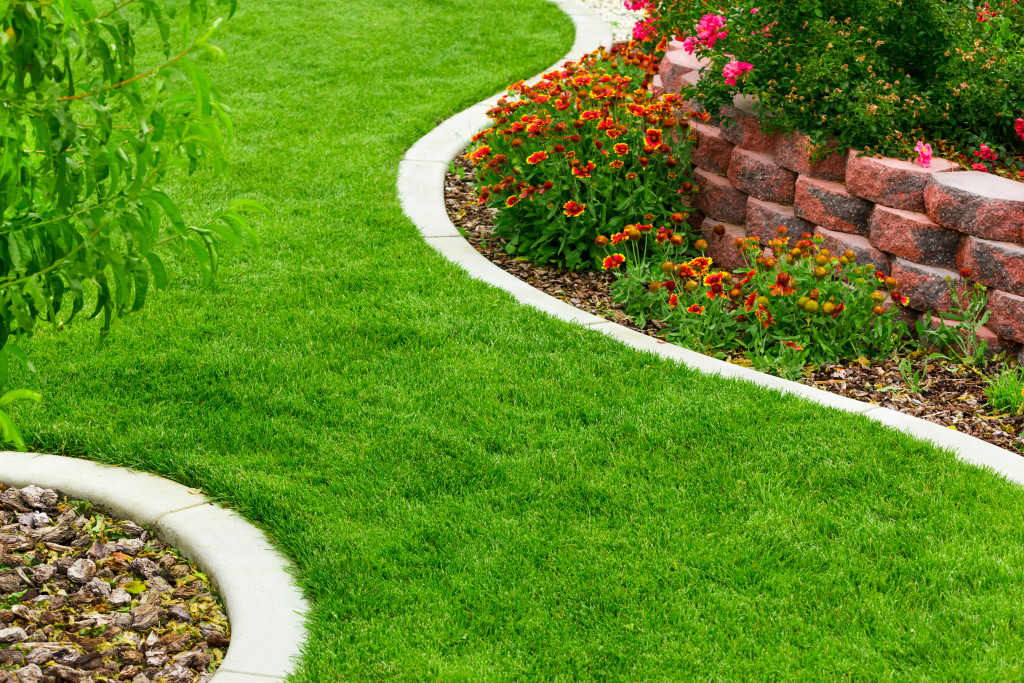• Utilize mulch to retain moisture and provide vital nutrients to plants while preventing weed growth.
• Install a sprinkler system to ensure plants get the right amount of water without wasting any.
• You should plant drought-tolerant species such as succulents and cacti for low maintenance needs.
• You should employ natural pest control methods such as companion flowers or composting.
• Take advantage of technology with apps and online resources to help you identify plants and monitor soil conditions.
Gardening is a great hobby that can help you reduce stress and give your home a beautiful outdoor living space. But with busy schedules, it can be challenging to keep up with the demands of gardening. Here are a few simple tips to help you take care of your home garden with minimal effort.
Make Use of Mulch
Mulch is made from organic material such as straw, leaves, and wood chips which helps retain moisture and provide nutrients to plants. Not only does it prevent weeds from growing in your garden, but it also helps keep soil temperatures consistent and reduces erosion due to heavy rains or strong winds. Mulch is also an affordable way to spruce up your garden and give it a neat, finished look.
Install a Sprinkler System
One of the most essential aspects of gardening is making sure plants get enough water. Invest in a sprinkler system to ensure that your plants get the right amount of water without you having to do anything. Plus, if you’re trying to conserve water, a sprinkler system will ensure that no water is wasted by only delivering what’s necessary for optimal growth. Just make sure you employ the help of professionals to get your sprinkler system installed correctly.
Plant Drought-Tolerant Species
If you’re looking for low-maintenance plants for your garden, consider drought-tolerant species such as succulents and cacti, which require less water compared to other types of plants. They also come in a variety of colors and textures, so you can create a unique look in your garden without all the extra work! Additionally, you can also opt for native plants as they are adapted to the environment and require much less maintenance.
Employ Natural Pest Control
Natural pest control methods are an effective way to defend against pests without using any harsh chemicals or pesticides that may harm your garden’s delicate ecosystem. Try planting companion flowers such as marigolds or nasturtiums which naturally repel certain pests while attracting beneficial ones like bees which help pollinate your plants! Natural pest control is also a more sustainable option for your garden.
Prune Regularly

Pruning is necessary to keep plants healthy and encourage new growth. Make sure you regularly prune, as this will help eliminate dead or dying stems, which can be an ideal breeding ground for pests. Pruning also allows plants to absorb more sunlight and nutrients while stimulating the production of essential oils and fragrances.
Take Advantage of Technology
There are plenty of apps and online resources that make gardening easier than ever. Here are a few of the best ones you should know about and how they can help you:
GrowIt!
A gardening community that helps you identify plants, connect with other gardeners and get advice on how to care for your plants.
Sprout Robot
An automated system that monitors soil moisture, temperature, pH levels, and more so you can optimize conditions for your plants.
LeafSnap
A plant identification app that uses real-time image recognition to help you figure out what’s growing in your garden quickly and easily.
GardenTags
A social network for gardeners so you can share photos, advice, and tips with other gardening enthusiasts.
Taking advantage of technology can help you stay one step ahead when it comes to taking care of your home garden!
Utilize Compost

Composting is a great way to give your plants the necessary nutrients they need to grow. All you have to do is collect organic waste such as fruits and vegetables, coffee grounds, egg shells, and other items and let them decompose over time. This will create nutrient-rich soil for your plants that won’t need to be fertilized as often. Additionally, composting is an eco-friendly way to reduce household waste and help the environment.
With a few simple tips and tricks, maintaining your home garden can be easy and stress-free. From mulching to utilizing technology, there are plenty of ways you can keep your plants healthy with minimal effort.
Utilizing natural pest control methods such as companion flowers or composting will help reduce the amount of time spent on maintenance while providing essential nutrients for optimal growth. With these tools in hand, you’re sure to have a beautiful outdoor living space that is low-maintenance!
